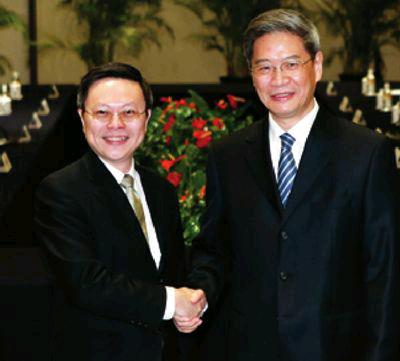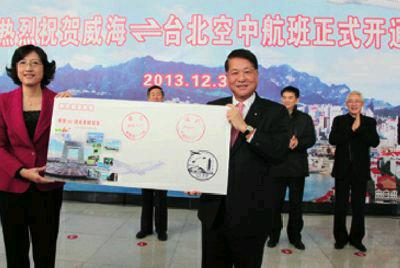Historic Breakthrough
2014-03-04ByXinHua
By+Xin+Hua
Top leaders on cross-Straits relations from the Chinese mainland and Taiwan met formally for the first time since 1949 on February 11.
At their meeting in Nanjing, capital of east Chinas Jiangsu Province, Zhang Zhijun, head of the State Council Taiwan Affairs Office (SCTAO), and Wang Yu-chi, Taiwans mainland affairs chief, agreed to open a regular communication channel between their departments.
“I believe that we will improve exchanges, understanding and mutual trust with this arrangement, and be able to better handle outstanding obstacles in cross-Straits exchanges,”Zhang said. He added that the move shows deepening mutual political trust on the basis of the 1992 Consensus between the mainland and Taiwan on the one-China principle.
When explaining how the communication channel will operate at a press conference, Wang said that senior officials of the two departments could “just pick up their mobile phones and talk” instead of setting up a special hot line.
Wang Zhiguo, an assistant researcher with the Institute of Taiwan Studies at the Chinese Academy of Social Sciences, said that the success of the first formal meeting between Zhang and Wang and the establishment of a regular communication channel are significant to deepening cross-Straits political trust. Furthermore, it may bring about substantial progress and help lay a more solid foundation for promoting the all-round development of ties between the mainland and Taiwan.
Zhang and Wang first met informally on the sidelines of the Economic Leaders Meeting of the Asia-Pacific Economic Cooperation in Bali, Indonesia, last October, when they agreed to mutual visits.
The latest Zhang-Wang meeting is an important breakthrough and may lead to regular visits, according to Yan Anlin, Executive Director of Institute for Taiwan, Hong Kong & Macao Studies at the Shanghai Institutes for International Studies.
It was revealed by Ma Xiaoguang, a spokesman for the SCTAO, that Zhang had accepted Wangs invitation to visit Taiwan during their meeting.
Significant meeting
In his speech at the meeting, Wang described his meeting with Zhang as “unimaginable in earlier years.”
“Being able to sit down and talk is valuable, considering that the two sides were once almost at war,” Wang said.
Zhang agreed that such a meeting would have been impossible earlier and called for “a little more imagination” in cross-Straits relations.endprint
Relations between the mainland and Taiwan stalled when the Kuomintang, led by Chiang Kai-shek, fled to Taiwan in 1949 after being defeated in a civil war.
Business and personnel exchanges resumed in the late 1980s, and in the early 1990s, the two sides began engagements with one other through the mainland-based Association for Relations Across the Taiwan Straits (ARATS) and its Taiwanese counterpart the Straits Exchange Foundation (SEF).
The ARATS and SEF are two nongovernmental organizations that were founded in 1991 and 1990 respectively to focus on detailed affairs and cross-Straits agreements.
In November 1992, the ARATS and the SEF reached a common understanding that each of the two organizations should express verbally that “both sides of the Taiwan Straits adhere to the one-China principle.”
ARATS-SEF talks have been speeding up since 2008 and have produced a number of important agreements, including lifting the bans on direct shipping, air transport and postal services in 2008, and the long-awaited Economic Cooperation Framework Agreement (ECFA) in 2010.
However, the new communication channel between cross-Straits affairs departments on both sides will not replace talks between the ARATS and the SEF, according to a statement from the SCTAO. Nor will it change the way other departments contact each other, the document added.
Zhang Nianchi, Director of the Shanghai Institute for East Asian Studies, said that the new arrangement is in line with the one-China principle and will play a different role from the ARATS-SEF talks. “They will not collide with each other. The cross-Straits affairs departments talk about bigger and more general topics,” he said.
Liu Xiangping, deputy head of the Institute of Taiwan Studies at Nanjing University, believes the new arrangement should help the ARATS-SEF talks to be more effective.
Great expectations
The talks between Zhang and Wang also touched upon topics on followup consultations on the ECFA, exchange of representative offices between the ARATS and the SEF and media exchanges between both sides, said the SCTAO statement.
According to Ma, during the meeting, Zhang said that the mainland will do their utmost to meet the demands of their compatriots in Taiwan and ensure that they can reap more tangible benefits through cross-Straits cooperation. In addition to putting the ECFA into effect as soon as possible, Zhang called for accelerated negotiations to reach cross-Straits agreements on trade in goods and settlement of disputes.endprint
Ma quoted Zhang as saying that completion of follow-up consultations on the ECFA within the year will be possible as long as both sides are mutually considerate and are sure to cooperate with each other.
Professor Su Chia-hung at Taiwans Fooyin University told Xinhua News Agency that the meeting between top officials from the mainland and Taiwan on cross-Straits affairs is good for the island and will lead to closer economic and cultural cooperation.
“If such meetings produce concrete outcomes and better services for the common people, Taiwan will welcome the arrangement,”Su said.
A poll conducted in Taiwan in mid-January showed that about 60 percent of local residents support the meeting between Zhang and Wang.
Chang Wu-ueh, a professor at the graduate institute of China studies at Taiwans Tamkang University, told Xinhua News Agency that the meeting provides a promising prelude to tackling political issues and perhaps to meetings between senior leaders.
“We cannot expect too many achievements in one night. They will have to work harder on many issues,” Chang said.endprint
